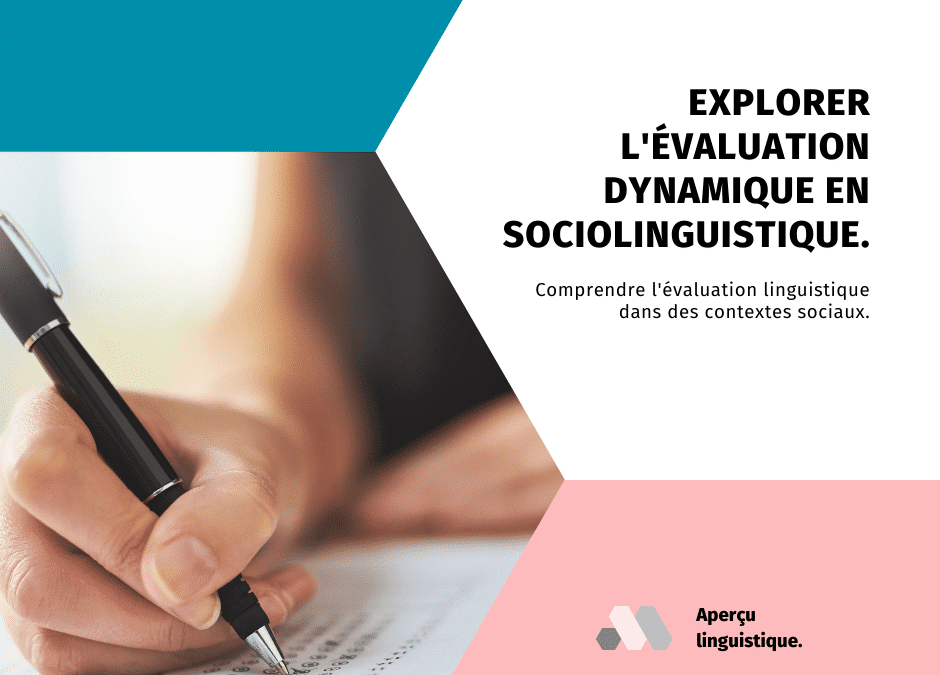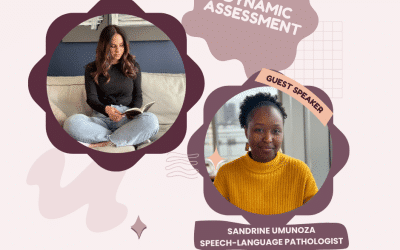Dynamic Assessment and Multilingual Support with Dr. Taylor Benyahia
In celebration of Speech and Hearing Month, I had the pleasure of hosting a live dinner session with the incredible Dr. Taylor Benyahia. Here is a comprehensive summary of our enlightening conversation, offering invaluable insights into dynamic assessment and multilingual support. Note that the interview was conducted in English for those who wish to listen.
INTRODUCING DR. TAYLOR BENYAHIA: A BEACON OF MULTILINGUALISM AND SOCIOLINGUISTICS
Taylor Benyahia brings a wealth of experience from her background in sociolinguistics, with over a decade of dedication to understanding and celebrating linguistic diversity. Her journey began at an international ballet school, surrounded by various languages and cultures, which fueled her passion for multilingualism. This passion led her to advanced studies in education and linguistics in the United States and France, where she conducted research on bilingual babies and multilingual education strategies during her master’s and doctoral programs at the Sorbonne.
DYNAMIC ASSESSMENT: EMBRACING LINGUISTIC VARIATION AND CULTURAL NUANCES
Our discussion highlighted dynamic assessment, a topic for which Taylor is passionate due to its potential to support bilingual and multilingual families. Dynamic assessment focuses on children’s learning potential rather than static measures of knowledge. This approach is essential in contexts where children come from diverse linguistic backgrounds, ensuring that assessments are culturally and linguistically responsive.
KEY TAKEAWAYS:
- Linguistic Variation and Context: It is crucial to recognize linguistic variation, dialects, and the sociocultural context of the child’s language use for equitable and informative assessments.
- Narrative and Cultural Priorities: Different cultures prioritize various aspects of storytelling, such as plot progression versus contextual details. Understanding these differences is essential in assessments.
- Adapting Assessment Tools: It is necessary to adapt tools and methods to better address the linguistic and cultural diversity of the families you work with.
- Empowering Families and Speech Therapists: Strategies to empower both families and speech therapists, including creating guides, conducting educational sessions, and sharing the successes of bilingualism.
A CALL TO ACTION FOR INCLUSIVITY AND DIVERSITY IN SPEECH THERAPY
The information shared by Taylor underscores the importance of supporting linguistic and cultural diversity in our communities. In celebration of Speech and Hearing Month, commit to advancing your practices to be more inclusive and recognize the richness of languages and cultures. Together, we can significantly impact the lives of children and families by validating and supporting their multilingual abilities.
This live session not only provided a platform to discuss advances in speech therapy but also highlighted the need for ongoing dialogue and action toward more inclusive and dynamic assessment practices. Let’s continue this momentum by integrating these valuable insights into our daily practice to better serve the diverse communities we work with.
Dr. Taylor Benyahia, whose work clearly addresses cultural and linguistic barriers in speech therapy, has made significant contributions to the field, demonstrating the need for culturally sensitive and adapted approaches in therapy.
ARTIFICIAL INTELLIGENCE AND SPEECH THERAPY
Several important points about the use of AI in speech therapy were discussed:
- Personalized Therapy Solutions: AI can offer personalized therapy solutions, adapted to individuals’ unique linguistic and cultural needs.
- Increased Accessibility: AI-based tools and applications could provide accessible practice opportunities for patients, making therapy more accessible in the absence of interpreters.
- Personalization and Efficiency: Data-driven insights from AI could help therapists personalize their approaches, ensuring that therapy is more effective and aligned with individual needs.
For those interested in the intersection of AI and speech therapy, I recommend keeping up with industry news and academic publications in the field. This rapidly evolving domain promises to bring innovative solutions that could significantly impact the efficiency and accessibility of speech therapy services.
AI: SUPPORTING MULTILINGUAL FAMILIES
To further support speech therapists working with multilingual families, I highly recommend exploring AI-powered tools designed to assist speech and language pathologists with a variety of tasks. It offers features such as language sample analysis, report generation, and personalized therapy recommendations.
How AI Can Help:
- Language Sample Analysis: Automatically transcribes and analyzes language samples, helping therapists identify linguistic patterns and areas needing intervention.
- Report Generation: Generates detailed reports, saving therapists time and ensuring accurate documentation.
- Personalized Therapy Recommendations: Provides customized therapy suggestions based on the individual needs of each client, taking into account their linguistic and cultural background.
- Increased Efficiency: Streamlines administrative tasks, allowing therapists to focus more on direct intervention and client interaction.
Nataly SLP can be a valuable addition to your practice, especially when working with multilingual families. By leveraging AI, it enhances the ability to provide culturally responsive care and improves overall therapy outcomes.
Stay informed and continue exploring new tools and methodologies, like those discussed by Taylor. This is essential for providing the best possible care.
To stay updated with the latest information and contributions from Taylor Benyahia, follow her on social media via her Instagram handle @DrtaylorBenyahia.



